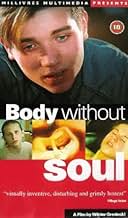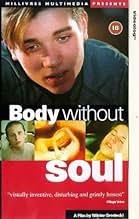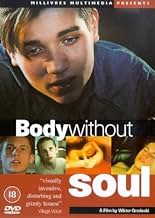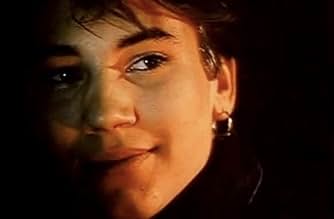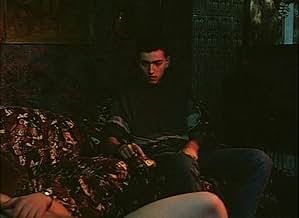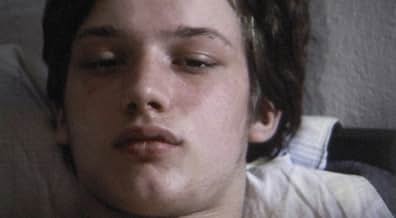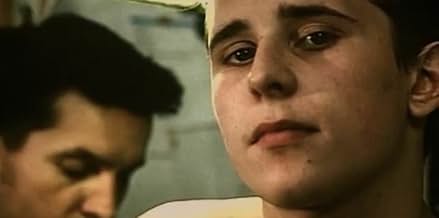Ajouter une intrigue dans votre langueRaw portrayal of the controversial East Europe sex trade forcing nubile young men into prostitution, exposing their harsh realities on streets, porn shoots, and inner struggles.Raw portrayal of the controversial East Europe sex trade forcing nubile young men into prostitution, exposing their harsh realities on streets, porn shoots, and inner struggles.Raw portrayal of the controversial East Europe sex trade forcing nubile young men into prostitution, exposing their harsh realities on streets, porn shoots, and inner struggles.
Histoire
Le saviez-vous
- Autres versionsThe 18-rated UK release of this film was cut by 1 minute and 40 seconds by the BBFC.
Commentaire en vedette
Wiktor Grodecki is a brave filmmaker, one who is unafraid to address a controversial subject, yet one who is able to make a powerful sociological statement by creating a metaphorical art film that demands respect.
Grodecki interviews young boys (ages 14 - 17) who are male hustlers in Prague: he wisely removes (for the most part) the interviewer questions allowing the individual boys to make spontaneous, searing comments. These young lads discuss why they became male prostitutes, how they deal with selling their bodies, where they find their business (the train station, the swimming pools, etc), how they feel about the johns and about their fellow hustlers, the manner in which they do business including the way in which the financial aspects come to play - all in a way that burns the faces of these young lads into our psyches.
About half way through this film Grodecki introduces Pavel Rousek, a man who by day is a pathologist performing autopsies in the Prague morgue and in his off hours (using the pseudonym Hans Miller) creates, casts and directs gay porno videos in his home. Rousek is shown at the autopsy table gowning, gloving, and grotesquely performing an autopsy on a real cadaver while discussing both professions. There are moments while he is gloving that he explains why he doesn't allow his boys to wear condoms (the buyers of his videos don't want to see condoms), and the contrast between his self protection vs the enforcement of prevention of sexual protection of his actors is devastating.
Rousek as Miller is then shown filming the boys in his home, explaining the details of achieving the visual effects of pornography: simultaneously we again hear the boys views of that aspect of their 'careers', creating a pitiful tension. There is almost no total nudity in this film and when it does occur the lighting is so dark as to obscure it - making the overall effect even more dense and effectively tense. Under all of this lurid talk Grodecki uses classical music - Albinoni, Mahler, Mozart - which again provides a contradiction that makes the topic digestible.
The final question Grodecki poses to his subjects involves the boys perception of 'soul' and while there is a variety of responses, the overall message is that these lads sell their bodies as a career, but the soul is 'what you think', something that cannot be taken from you. Several of these boys have screen presence and faces that, were they noticed by regular film makers, would probably give them legitimate careers. But the power of the film comes from the words of these boys, knowing completely their choice of life, and therein lies the sorrow.
This is a tough but very fine piece of film-making. Interestingly, Grodecki absorbed this material and used it to create his subsequent feature film MANDRAGORA (reviewed under that title). This film is the more powerful of the two. Not a movie for everyone, but certainly an important document about a way of life few know and fewer understand. Grady Harp
Grodecki interviews young boys (ages 14 - 17) who are male hustlers in Prague: he wisely removes (for the most part) the interviewer questions allowing the individual boys to make spontaneous, searing comments. These young lads discuss why they became male prostitutes, how they deal with selling their bodies, where they find their business (the train station, the swimming pools, etc), how they feel about the johns and about their fellow hustlers, the manner in which they do business including the way in which the financial aspects come to play - all in a way that burns the faces of these young lads into our psyches.
About half way through this film Grodecki introduces Pavel Rousek, a man who by day is a pathologist performing autopsies in the Prague morgue and in his off hours (using the pseudonym Hans Miller) creates, casts and directs gay porno videos in his home. Rousek is shown at the autopsy table gowning, gloving, and grotesquely performing an autopsy on a real cadaver while discussing both professions. There are moments while he is gloving that he explains why he doesn't allow his boys to wear condoms (the buyers of his videos don't want to see condoms), and the contrast between his self protection vs the enforcement of prevention of sexual protection of his actors is devastating.
Rousek as Miller is then shown filming the boys in his home, explaining the details of achieving the visual effects of pornography: simultaneously we again hear the boys views of that aspect of their 'careers', creating a pitiful tension. There is almost no total nudity in this film and when it does occur the lighting is so dark as to obscure it - making the overall effect even more dense and effectively tense. Under all of this lurid talk Grodecki uses classical music - Albinoni, Mahler, Mozart - which again provides a contradiction that makes the topic digestible.
The final question Grodecki poses to his subjects involves the boys perception of 'soul' and while there is a variety of responses, the overall message is that these lads sell their bodies as a career, but the soul is 'what you think', something that cannot be taken from you. Several of these boys have screen presence and faces that, were they noticed by regular film makers, would probably give them legitimate careers. But the power of the film comes from the words of these boys, knowing completely their choice of life, and therein lies the sorrow.
This is a tough but very fine piece of film-making. Interestingly, Grodecki absorbed this material and used it to create his subsequent feature film MANDRAGORA (reviewed under that title). This film is the more powerful of the two. Not a movie for everyone, but certainly an important document about a way of life few know and fewer understand. Grady Harp
- gradyharp
- 20 sept. 2005
- Lien permanent
Meilleurs choix
Connectez-vous pour évaluer et surveiller les recommandations personnalisées
- How long is Body Without Soul?Propulsé par Alexa
Détails
- Durée1 heure 34 minutes
- Mixage
- Rapport de forme
- 1.37 : 1
Contribuer à cette page
Suggérer une modification ou ajouter du contenu manquant

Lacune principale
By what name was Telo bez duse (1996) officially released in Canada in English?
Répondre
